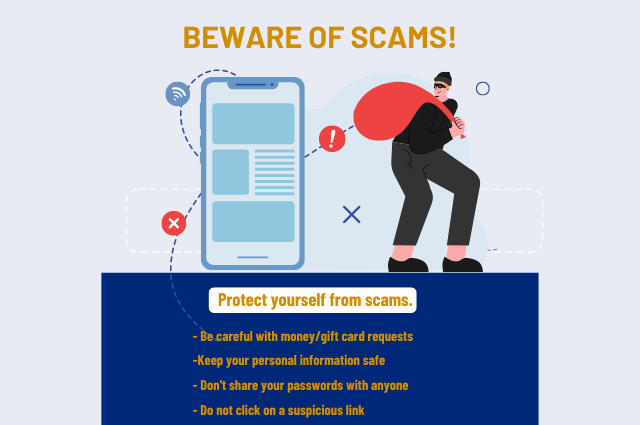Protect yourself from scams
If you receive an email, text, or phone call requesting something strange or demanding large sums of money, SLOW DOWN. Do not rush to act. No legitimate agency will demand money (or payment of any kind) to maintain immigration status or prevent arrest.
A number of scams target international students and scholars in the US and have become more sophisticated and convincing recently. You may receive fraud attempts on the phone, through an email, or from a text.

According to an important article about online scams in Emory News, the five most common scams are as follows:
- Gift card scams
- Impersonation of a government agency or law enforcement
- Extortion scams
- Job scams
- Tech support scams
The Emory Police recommend looking out for the following clues in their fraud tips list:
- Appeals for emergency assistance
- Offers that are too good to be true
- Threats to your academic standing or immigration status
- Requests for personal information
- Blackmail attempts
Slow Down!
Check the email address of the sender. Before responding or taking the requested action, ask yourself and others if this could be a scam. When in doubt, email police@emory.edu or call 404-727-6111 for assistance.
When in doubt about the validity of a message, report it by forwarding the email as an attachment to police@emory.edu and abuse@emory.edu. If you’re ever unsure about a message, reach out to your IT service desk. For Emory University, that’s 404-727-7777 and for Emory Healthcare, that’s 404-778-4357. If you believe your password has been compromised, change it immediately at MyPassword.
These encounters can be troubling and you may want to resolve them as quickly as possible, but there are some steps you should take to avoid being scammed.
Resources
- Read this important Emory News article with tips for avoiding online scams.
- Here are some tips to avoid from Emory Police.
- Watch this presentation on Avoiding Scams by the Emory Police for more tips!
Check out these USCIS tips - avoiding scams - Read this SEVP message to students about scams
- Here is the ICE Tip Line
- Check out this IRS tax scam tips videos & IRS tax tip sheet
- Read these SSA tips to avoid scams & SSA Frequently Asked Questions on Fraud
- Here are Federal Trade Commission tips to avoid coronavirus-related scams
Tips
Internaitonal students and scholars should especially keep these tips in mind:
- Do not provide or confirm any information about yourself even it sounds like they have your information. It is a scam.
- Do not give out or confirm your name, date of birth, Social Security Number, bank account or credit card information, passport number, Alien Registration Number, I-94 information, arrival/departure record, passwords, etc.
- Do not buy them gift or cash cards.
- Do not wire or transfer money to them.
- If you receive a call from someone who says they are from the U.S. Citizenship and Immigration Services (USCIS), your home government or a similar agency, please hang up—even if your caller ID shows that the call is from USCIS/DHS/ICE/SEVP/FBI/Emory Police, etc. If they call again, tell them to talk to Emory ISSS at 404-727-3300.
- If you receive a call from someone who says they are from the Social Security Administration (SSA), hang up. The SSA will never call you and ask for money. Do not provide personal information or send money. You can report the scam call to the Social Security Administration online.
- If you are contacted by someone claiming to have information about your immigration status, contact your ISSS advisor right away. If you’re not sure whether it’s a legitimate call, ask your ISSS advisor for guidance.
- If you are contacted by someone who threatens to file a lawsuit against you, revoke your driver’s license, arrest you, or deport you, hang up and contact your ISSS advisor. If this is a legitimate bill or fine, you should have received written correspondence in the mail before the call/text/email. The scammer might provide a fake IRS badge number, fake "proof" that you committed a crime, send bogus emails to support their call, or imitate a local police officer or government employee—and they might know the last 4 digits of your Social Security Number.
DHS/USCIS
The U.S. Department of Homeland Security (DHS) issued a warning about a scam using the department’s hotline telephone number. Scammers have identified themselves as “U.S. Immigration” employees and have altered their caller ID so that it appears the call is coming from the department’s hotline (1-800-323-8603). They then demand that the individual provide or verify personally identifiable information, often by telling individuals that they are victims of identity theft.
Read the DHS OIG fraud alert for more details.
The U.S. Citizenship and Immigration Services (USCIS) offers the following advice:
If you receive a call demanding personal information or payment, hang up immediately.
If you want to verify whether a call is from USCIS, you may do one of the following:
* Call our National Customer Service Center at 800-375-5283 to ask if you need to do anything about your case or immigration status,
* Make an InfoPass appointment at http://infopass.uscis.gov, or
* Use myUSCIS to find up-to-date information about your application.
Remember, USCIS officials will never threaten you or ask for payment over the phone or in an email. If we need payment, we will mail a letter on official stationery requesting payment.
How to Report a Call from a Scammer
If you receive a scam email or phone call, report it to the Federal Trade Commission. If you are not sure if it is a scam, forward the suspicious email to the USCIS webmaster at uscis.webmaster@uscis.dhs.gov. USCIS will review the emails received and share with law enforcement agencies as appropriate. Visit the Avoid Scams Initiative for more information on common scams and other important tips.
